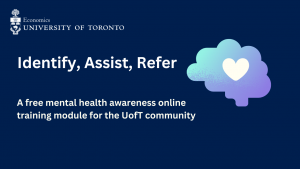
It’s OK to talk about mental health with (almost) strangers. You don’t have to have a close relationship with someone to check in on them. There are plenty of people you might not consider friends, but whom you will recognize like new neighbors who live on other floors of the residence or your condo tower, the people you sit near in the lecture hall, or the person working out on the next machine in the weight room every Wednesday.
What if something changed about them? What if the guy on the floor below stopped leaving his dorm room, or if the person two seats over in ECO101 stopped showering, or the girl in the weight room stopped lifting, but came to the gym to just stare off into the distance?
As much as no one wants to talk about it, having lots of acquaintances and few friends is a normal part of the university experience, especially in the first and second year. It’s a reality that can leave students just learning how to deal with becoming adults more vulnerable to mental health issues than they were before coming to university.
In certain individuals, signs of stress or anxiety are obvious, while for others there can be no signs of it at all. When you suspect an almost-stranger is having issues, should you check in with them?
It depends on what feels safe for you, and if the person consents to the conversation.
Usually, honest questions and answers are the direct path to talking about mental health and creating a safer space for everyone. That’s one of the take-aways from Identify, Assist, Refer (IAR) Training, a free on-demand training module open to the entire University of Toronto community. ALWAYS available, the training module takes slightly less than half-an-hour to complete.
IAR training will not turn you into a therapist. You will learn the basic skills and information needed to support people experiencing mental health challenges, whether or not they live with a mental illness.
The training has three themes:
Identify: Learn to spot the signs that someone might be in mental health distress.
Assist: Learn how to ask the questions and start the conversation to help the person dealing with mental health issues.
Refer: Apply the skills learned in the assist section by referring the person to on and off-campus resources and experts in mental health. You might choose to further assist the person to make the first phone call or leave the first message, whether that’s to same day counselling at UofT, or to the Gerstein Crisis Centre off campus , depending on what you’ve discussed during the assist portion of your conversation.
Click here to access the IAR training module and its recommended supports.
Return to the Department of Economics website.
Go to the newsletter main page.
